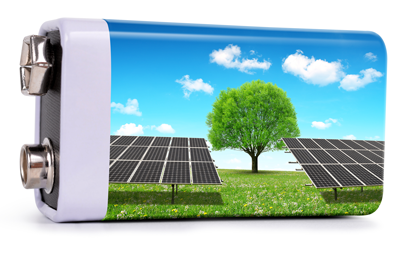If you’re working your way toward energy independence, incorporating solar batteries into your home system could be a powerful next step. Not only do they allow you to store excess electricity for use at a later date when your solar panels aren’t able to generate much, they also give you more options for how you power your home.
But what exactly is a solar battery, and how might you utilize one? If you’re looking to learn about new sources of green energy that will save you money and minimize your contributions to global carbon emissions, you’ve come to the right place. In this article, we’ll take a look at the science behind solar battery power and help you determine whether or not it’s a viable source of energy for your specific needs and budget.

What is a solar battery, and how does it work?
Solar batteries are devices that allow you to store the excess energy generated by your solar panels. By harnessing the full capacity of your solar potential when it’s at its peak—that is, during very bright daytime hours—you are able to make the most of it and use what’s stored during lower energy-producing times—like when it’s overcast, in the middle of the night or during a power outage.
So, how does a solar battery work? By combining multiple battery cells with advanced technologies that control the safety and performance of the battery, they essentially function as rechargeable lithium-ion or lead-acid batteries that use the power of the sun as the impetus for creating an electrical current.
By incorporating solar batteries into your home energy system, you’re able to take full advantage of the energy your panels capture. Without solar batteries, you end up sending excess energy to the grid because you aren’t able to use or store it yourself. While providing others with energy is nothing to be ashamed of—and can even earn you credits from your energy company—it may leave you limited in moments of need when solar energy is less readily available.
Can solar batteries save me money?
Solar batteries are a pretty significant investment—some cost as much as $10,000. But if your utility has demand charges or time of use rates, or if they don’t offer solar users net metering reimbursements, storing electricity within your home could save you from routine fees throughout the year. By avoiding tapping into often expensive electricity from the grid during periods when your solar panels are not generating as much energy, like at night or during overcast spells, you could significantly reduce your bills.
Another reason you may want to consider a solar battery is if you live in an area that frequently experiences power outages. If you have stored solar energy to utilize when the grid is unavailable, you’ll have no problem keeping your lights on. Depending on your circumstances, the liberation from worry could be well worth the initial cost.
If you’re interested in further exploring solar batteries, contact the knowledgeable team at Mohave Solar. We’ll walk you through all the options available to you, discuss your unique situation and help you determine the best course of action for your needs and budget.
